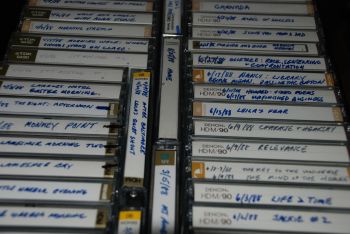


—
From: Debbie Rosenbaum
Junw 11, 2009 at 9:25 AM
To: nesson
you’re being portrayed as an extremist nut-job in the media for all your recording stuff.
one idea: maybe you can blog about *why* you like to record things.
is it because it gives you a different level of understanding when reflecting on a situation?
is it because you like to share your life with the world?
what is the impetus for your passion for recording? if you can help the public *understand*, maybe you’ll elicit more sympathy for your efforts.
———-
From: Charles Nesson
i’d rather demonstrate the value of it by continuing to audio blog the development of the case, but if someone curious was to interview me i’d be happy to explain. how about you first
:<)
———-
From: Debbie Rosenbaum
i was thinking you could email me your explanation and then post it to your blog. =)
———-
From: Charles Nesson
because if you don’t record you have nothing to post that the public can listen in on, and nothing to listen to yourself if you have need. the only proof you have of what happened is your own recollection, maybe the hearsay reports of others, and the opportunity to pay money for a transcript you can’t get for ninety days.
i believe this is an important case which calls for public attention. people are being unfairly ground beneath the crushing wheels of federal process put in riaa hands. i believe the public has a right to see how its courts are being used and joel and jammie have a right to show them. to me it seems a fundamental citizen’s right to record ones interactions with the state.
to say nothing of my own interest in representing joel. my memory is not good. i rely on my recorder to allow me to review and recall. this is integral to how i work.
and i’ve been at it for a long time
———-
From: Debbie Rosenbaum
so for you, it’s “objective evidence.” if the rest of the world gets by on “hearsay,” why is it so important to you to demonstrate objectivity?
———-
From: Charles Nesson
pls send me the press that is so describing me
———-
From: Debbie Rosenbaum
you should share those images on your blog. they are fabulous!
i read more than the average consumer of press that follows you and the tenenbaum/thomas cases, so my view is skewed, but your persistence in insisting on recording collectively comes across as annoying.
your/our non-traditional tactics have pissed off a lot of people, drawing wide eyes and criticism from both should-be-friends (beckerman), should-be-foes (sheffner), that letter you posted on your blog yesterday, and david’s continual harsh criticism on our clinical list-serv re: going to the SCOTUS with our webcast issue. with the ability to express views with wide distribution and low cost via the internet, the message that we’re/you’re crazy comes across; there are a lot more of “them” than there are of us.
we aren’t practicing law in the traditional sense, which scares a lot of risk-adverse attorneys. personally, i find it liberating to challenge the boundaries of legal procedure rather than conforming to the generations of “this is how it’s always been done so you must also do it this way,” but that’s also why i’ve gravitated towards having you as a mentor and teacher. it’s not the norm.
one of the best messages i’ve learned in this entire experience came from sheffner, much to my dismay, who explained that opponents can criticize each other tastefully and respectfully, which he has accomplished … but others have not. that’s my continual battle in PR efforts. and in the end, all these thoughts just underscore the need for strong and proactive PR to “explain what we’re thinking” at every move in the case.